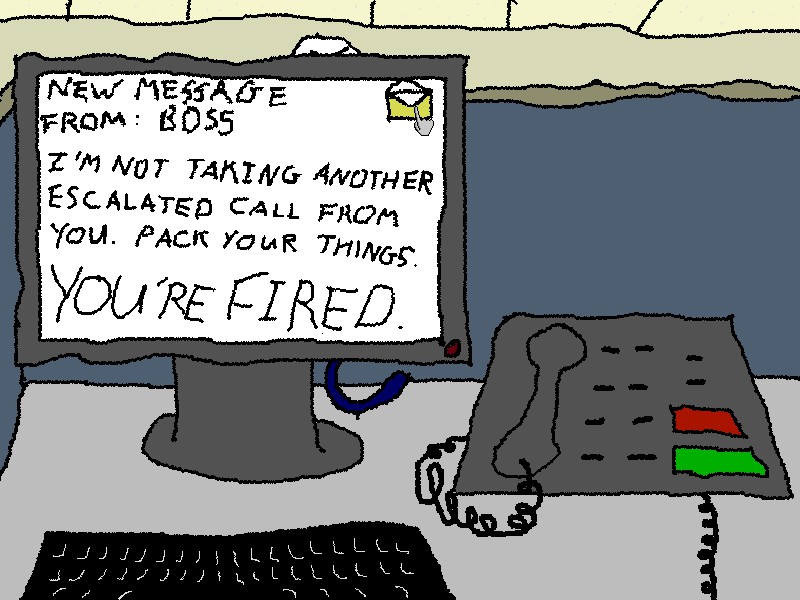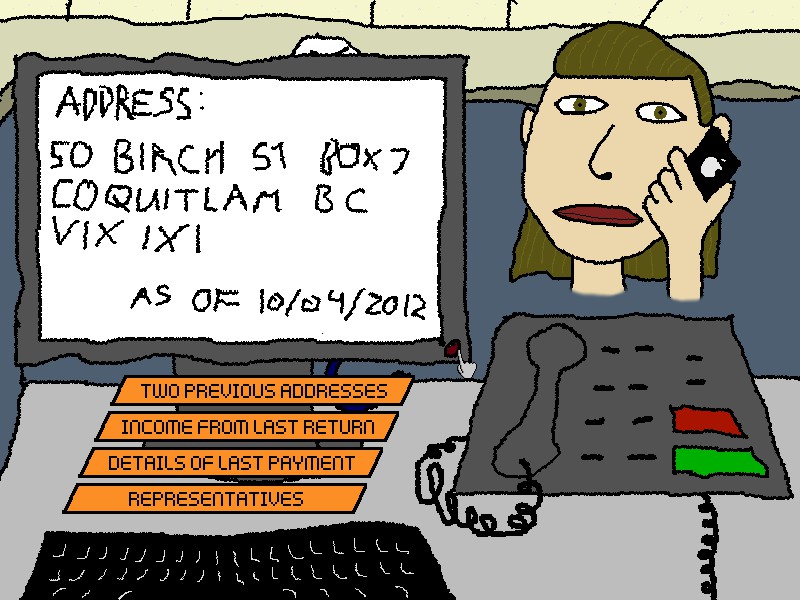There’s a famous concept among historians: the banality of evil. The idea states that when atrocities occur, when decisions are made that will have far-reaching, crushing consequences, they won't come from some criminal mastermind or grand Machiavellian scheme. More often than not those decisions will be the work of a perfectly average mind, motivated by utterly mundane motivations. The historian who coined the phrase was talking about one of the high ranking officers of the Third Reich.
What developer David Gallant taps into with I Get This Call Everyday is much smaller in scale, but likely hits closer to home: the effects of unyielding, never-ending, everyday belligerence on the human spirit. And whether you want to admit it or not, chances are, you were that evil to someone very recently. How? You picked up the phone.
I Get This Call Everyday is, on the surface, like many choose-your-adventure, Twine-crafted titles in recent years: an exercise in empathy, in which players inhabit a crude, MS-Paint mockery of a customer service environment. You are the voice on the other side of the telephone, armed with naught but a computer designed only for accessing customer information.
In this particular instance, you’re working customer service at the Canadian equivalent of the IRS. The game has but one caller: an early-20-something named Billy Swarth calling in with a relatively simple request: a change of address. I Get This Call Everyday is about the folks who provide the service. This is about the person you stopped thinking about the second that phone went click. This is about the person who will have to go through that exact same song-and-dance 50-100 times more that same day, and not slip once into a natural, human response, no matter what measure of abuse or ignorance comes out of that phone.

From the customer side, this should logically be a two-minute interaction: Tell the representative your name, tell them your new address, “Thanks”, click. From the agent side, it’s a different story. Many interactions may go smoothly, but just as many are impenetrable labyrinths of interrogation. Even getting to the correct account requires the exact name entered, which might not show up because the customer used a nickname/common name instead of their birth name. The customer might give their birthday, but might not give you their year or any other identifying information. Their address may be someplace they lived five years ago, and somehow, they can’t remember what that address was, and get spontaneously angry at the poor sap who’s just trying to find their info. The action the customer’s trying to perform might require answering security questions which the customer made when they were 16-years old, and have since forgotten.
This is the experience I Get This Call Everyday manages to translate admirably, given the simple tools on display. It’s really just a series of dialogue choices--often binary, but also fairly true to life--leading to an ending of some sort typically within about 2-5 minutes per call/playthrough. But this isn’t a game of winning or losing, or even of getting closure to a story. The goal here is to carefully extract the exact information needed to process this customer’s request while maintaining professionalism in the face of an enemy. And that enemy is Billy Swarth.
Billy is the petulant bane of a customer service rep. He doesn’t know most of his information, gives terse answers to every question, and gets mad at the rep for daring to try and dive deeper. He also doesn’t keep or have access to any of the necessary information foreven basic business with his account:“I don’t know, my mom handles all this for me.” Billy is a puzzle box where the puzzle has no real solution, and yet the puzzlemaster berates you for not being able to solve it. Billy is simply terrible.

And yet, therein lies the evil. While basic empathy or understanding from Billy might’ve helped make this interaction a little easier to bear, there is almost no understandable human reaction in this game that will get the player anything but fired by the nigh-omnipotent manager listening in on the call. Skipping the verification process? That’s a firing. Providing customer info to just push them to the next step? That’s a firing. Getting the customer angry enough to escalate to a supervisor? That’s a firing. Responding the customer insulting you? Oh you best believe that’s a firing. No, to be effective here is to maintain professionalism at the cost of any semblance of humanity, for no reward except being cursed at by the person you are attempting to help. If the Steam achievements can be believed, there is a way to complete the interaction successfully and change the address, but damned if I was able to figure it out.
And this is, as the title says, every day in the life of a customer service representative. It’d be funnier if it didn’t suddenly and sharply display that, unfailingly, at some point in our lives we have all been Billy Swarth. At some point, we have let impatience or ignorance ruin someone’s day, and that person has had no choice but to suffer while smiling.
I Get This Call Every Day is a fairly succinct statement on the matter--the only real flaw in the experience being the unskippable credits sequence putting a 2-minute gap between you and another playthrough--and yet, in a just world, the empathy afforded by sitting in service for any period of time should stick with the player for years. As mind-numbing and soul-draining as the game (and customer service in general) tend to be, any game whose ultimate lesson turns out to be, just maybe, be better to each other, is an experience worth having.